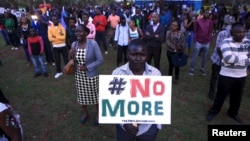A new survey released Friday indicates 60 percent of Kenyans believe their country is headed in the wrong direction after a spate of terror attacks, and more than three quarters of the respondents deem militant group al-Shabab a serious threat.
The new poll was taken both before and after the Garissa University College attack in early April that claimed the lives of 148 people.
The research firm IPSOS found that there was an increase in how people felt about the stability of their country after a series of terror attacks by militant group al-Shabab.
IPSOS research analyst Tom Wolf says three-fifths of Kenyans think the country is heading in the wrong direction.
“When we compare the responses before and after Garissa for example, the wrong direction goes up 12 percent from 49 to 60 percent and people thinking Kenya is going the right direction, it drops by 12 percent from 32 to 20," he said. "So, again, I am just showing you how quickly opinion responds and as I say we had no way of knowing what percent of all respondents who were interviewed after April 2 even knew about the attack in Garissa.”
Wolf notes Kenyans view insurgent group al-Shabab as a major threat to their country.
“In asking the question how bigger a threat do you think al-Shabab is to Kenya right now, 1,364 people interviewed before the attack in Garissa, on average 66 percent said a major threat and after the interviews 452 were interviewed after 80 percent said it’s a major threat that’s an increase of 14 percent just as the result of the attack,” he said.
Just like their political leaders, Kenyans are also divided over the presence of their troops in Somalia. Fifty-one percent want Kenyan forces to stay in Somalia and continue to fight al-Shabab and 49 percent want them to return and man its borders.
According to IPSOS, the questionnaire was finalized immediately after President Uhuru Kenyatta delivered his State of the Nation address to parliament in late March.
Researchers say the Garissa attack happened while some of their workers were still in the field and no questions were included about the attack itself.




